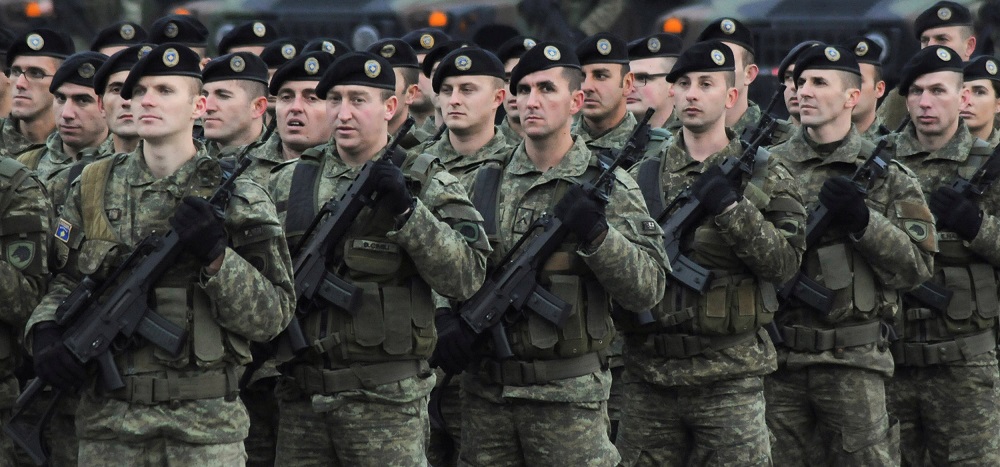Alwaght- Despite the fact that the worldwide competition of the Eastern and Western blocs ended nearly three decades ago, these days, the escalating tensions in Eastern Europe are echoing the rivalry of the Cold War period between the powers.
Less than a month ago, confrontation between Russian and Ukrainian navy vessels near Crimea Peninsula led to tensions between Moscow and Kiev and subsequently with the West. And recently a decision by Kosovo to create a national army has pressed the tensions in the Balkans region to a new level.
The stances on the Kosovo decision look quite like a mystery as the opponents and supporters of the move have shown rise of a new polarity different from the traditional ones. While Russia, the EU, and NATO came against the measure, the US and Britain strongly backed the decision by Kosovar parliament. The Russian-NATO closeness of positions in the face of US-Britain is rare and perhaps unprecedented.
Controversial army creation
A week ago, 107 members of the Kosovo parliament approved a bill that ordered the formation of an organized military force for the armyless nation. This approval went on while 9 lawmakers from the Serbian minority boycotted the vote by their fellow parliamentarians.
According to the bill, the Kosovo Security Forces will be transformed into a regular army, with the current 2,500 personnel set to be doubled. The army will have the main role of defending the country.
UN worry
As Kosovo lawmakers passed the bill, the UN held an emergency session at the request of Serbia on Monday. The UN Secretary-General Antonio Guterres expressed his concern about the Kosovar intention.
Stephane Dujarric, the spokesman for Guterres, in a press conference said the 1244 UN resolution of 1999 is the sole legal framework for the international security presence, the Kosovo multinational security force. So, any restriction of the responsibility of these forces will be a violation of the resolution.
Guterres, the spokesman said, told all of the involved sides to avoid contentious measures that will compound the EU-sponsored Belgrade-Pristina talks.
Kosovo army creation: supporters and opponents
So far, Russia the North Atlantic Treaty Organization, and Serbia opposed Pristina army creation. The Serbian government expressed worry about risks posed to Serbian minority in Kosovo. Some 100,000 Serbs are living in Kosovo.
Jens Stoltenberg, the NATO chief, also came against the Kosovo Assembly’s bill, saying that the decision comes while NATO members have already shown concerns about such an action. He said the organization will review its commitments to Pristina.
He maintained that Kosovo army creation will trigger new tensions in the region and also put obstacles ahead of processes like Kosovo membership in the organization.
Russia also opposed the bill. The Russian UN envoy Vassily Nebenzia told the Security Council that “the decision on transforming the Kosovo security forces into the Kosovo defense forces has become a gross violation of the [UN] Security Council resolution 1244.” The Russian Foreign Ministry said that Moscow hopes that the international forces in Kosovo take measures to help reverse the “unconstructive” decision.
The US and Britain, on the other side, supported the idea. The support drew Serbian government’s opposition. Belgrade stressed that the measures are an American design.
Why is Kosovo army creation controversial?
What makes the creation so sensitive is Serbia’s refusal to recognize the former Yugoslavian republic as an independent state. Pristina announced independence in 2008 but Belgrade said it will never recognize its statehood.
On the other side, Serbia and Kosovo need to set aside their old hostilities and normalize relations to qualify for EU membership. That is why the EU has conservatively expressed objection, saying de-escalation is the crucial condition for the two sides’ accession.
Just contrary to Europe, the US administration is supportive of the Kosovo army foundation. In late 2017, under Washington’s pressure, Kosovo President Hashim Thaci suggested the formation of a national army to replace the current security forces. Britain is another supporter. London sees the decision helping the security of the new state. It seems that Washington and London seek a common goal behind their backing.
The new army will mean renewed tensions which are serious obstacle ahead of the two former Yugoslavian republics’ joining the EU. Over the past two years, the US President Donald Trump has shown he strongly desires EU impairment. He several times supported Britain’s exit from the 28-nation bloc. So, any step that undermines EU expansion will meet Trump favor. Kosovo army creation is no exception. Yet another reason for the American leader to show support to Pristina is the economic interests. A new army will require arms purchases. Washington can provide the necessary military equipment.
The same goal of undermining the EU also motivates London to back Pristina move as Britain is at odds with the EU over a Brexit deal. London does not want to see an expanded EU. Britain does not want to see the boost of the European power and sway because it is uninterested to see itself neighboring a strong bloc stretching to Eastern Europe.
The creation of the Kosovo army has another problematic aspect– Russian opposition. Russia, as a country with specific traditional approach to the Eastern Europe states as its sphere of influence, prefers to see the regional countries to move in line with Kremlin policies. A Kosovo army armed by the Americans and relied on the American training will not appeal to the Russians. That is driving Moscow's negative approach to the move. But Washington finds Pristina a potential base for expanding in Eastern Europe, to Russia's chagrin.



























